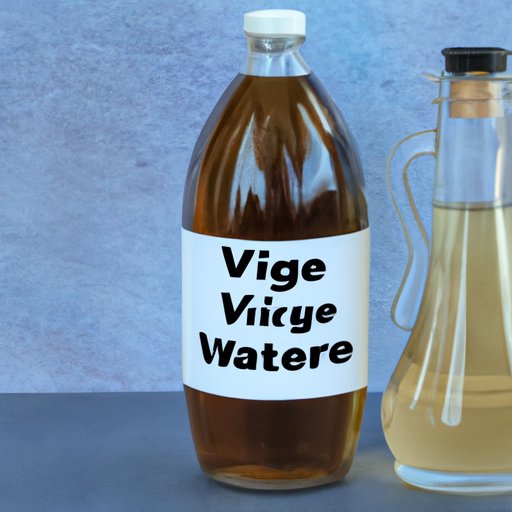
Introduction
For those with a gluten intolerance or celiac disease, following a gluten-free diet can be challenging. Many foods and ingredients have hidden gluten that can lead to allergic reactions or health complications. Vinegar, in particular, has caused much confusion and debate over whether it is gluten-free, especially malt vinegar.
In this article, we will provide a comprehensive guide to help you determine if malt vinegar is safe for a gluten-free diet. We will also explore alternative vinegars and offer tips for navigating a gluten-free diet safely.
A Comprehensive Guide to Malt Vinegar: Is it Really Gluten-Free?
Malt vinegar is a type of vinegar made by fermenting malted barley and water. Its tangy and slightly sweet flavor profile makes it a popular condiment for fish and chips, pickling, and salad dressings.
However, the ingredients in malt vinegar contain gluten, which can be harmful to individuals with gluten intolerance or celiac disease. Gluten is a protein found in wheat, barley, and rye that can cause inflammation and damage to the small intestine in those with celiac disease.
Despite containing gluten, studies have shown that the fermentation process in malt vinegar reduces the gluten content significantly. However, the science behind gluten detection is still imperfect, and it is challenging to identify a safe threshold for those with gluten intolerance or celiac disease.
According to the Celiac Disease Foundation, individuals with celiac disease should avoid malt vinegar entirely, while those with gluten intolerance should consult with their healthcare provider before consuming it. Therefore, it is important to consider your individual needs and tolerance before incorporating malt vinegar into your diet.
Navigating the Gluten-Free Diet: Understanding the Role of Malt Vinegar
Following a gluten-free diet can be challenging due to the prevalence of hidden gluten in many foods and ingredients. Different types of vinegar have varying levels of gluten content, with malt vinegar having the highest levels.
If you have a gluten intolerance or celiac disease, it may be challenging to navigate the different types of vinegar. Hence, the safest types of vinegar for those with gluten intolerance or celiac disease are distilled vinegar, apple cider vinegar, and white wine vinegar.
However, if you still prefer to use malt vinegar, you can choose to use those made with distilled vinegar instead of malted barley to reduce the gluten content and minimize the risk of exposure.
In addition, it is essential to ensure that your food and cooking area is gluten-free, especially if you are using ingredients that contain gluten. Always read labels, ask questions when ordering food or dining out, and avoid cross-contamination with cooking utensils.
The Pros and Cons of Using Malt Vinegar for Gluten-Free Cooking
Malt vinegar has its advantages and disadvantages when it comes to gluten-free cooking.
Advantages include the robust and tangy flavor profile that adds depth and richness to various dishes. It is also commonly used in pickling, which provides an easy way to add flavor to a variety of fruits and vegetables that are naturally gluten-free.
On the other hand, using malt vinegar for gluten-free cooking has potential risks of gluten contamination. Suppose you are highly sensitive to gluten; it may be advisable to avoid malt vinegar entirely, even those made from distilled vinegar. In addition, those with celiac disease should avoid consuming malt vinegar altogether.
Ultimately, the decision to use malt vinegar depends on your individual needs and preferences. If you choose to use malt vinegar, always check ingredients lists for malted barley and ensure that it is not cross-contaminated with gluten in the production process.
Top Gluten-Free Vinegar Alternatives You Should Try
For those with gluten intolerance or celiac disease, it is vital to have an alternative to malt vinegar. Here are the top gluten-free vinegar alternatives:
- Distilled white vinegar: made from diluted grain alcohol and has a sour and sharp taste
- Apple cider vinegar: made from fermented apples and has a sweet and tart taste
- White wine vinegar: made from white wine and has a mild taste
- Balsamic vinegar: made from grape must and aged in barrels, has a sweet and complex flavor profile
- Red wine vinegar: made from red wine and has a bright and tangy taste
When substituting malt vinegar with a gluten-free vinegar alternative, it is essential to consider the taste and acidity level of the vinegar. In some cases, the vinegar may need to be diluted with water or another suitable liquid to achieve the desired flavor profile.
The Surprising Truth About Malt Vinegar and Gluten
The debate on whether malt vinegar is gluten-free or not has caused much confusion for those with gluten intolerance or celiac disease. However, research has shown that the fermentation process in malt vinegar significantly reduces gluten levels, making it safe for some individuals.
According to a study published in the Journal of Cereal Science, a significant amount of gluten was removed during the fermentation process of malt vinegar. However, some gluten was still present, and the levels varied depending on the type of malt used.
Therefore, while malt vinegar may be safe for some individuals with gluten intolerance, those with celiac disease should avoid it altogether to prevent the risk of allergic reactions and other health complications.
Conclusion
In conclusion, malt vinegar does contain gluten, but fermentation significantly reduces its levels. However, it is still essential to consider individual needs and preferences before incorporating malt vinegar into a gluten-free diet. It is also vital to be aware of alternative vinegars and how to use them safely in cooking and eating out.
By following the tips and recommendations outlined in this article, those with gluten intolerance or celiac disease can navigate their diet safely and confidently.
What are your thoughts and experiences on using malt vinegar in a gluten-free diet? Please share your insights and feedback in the comments below.




